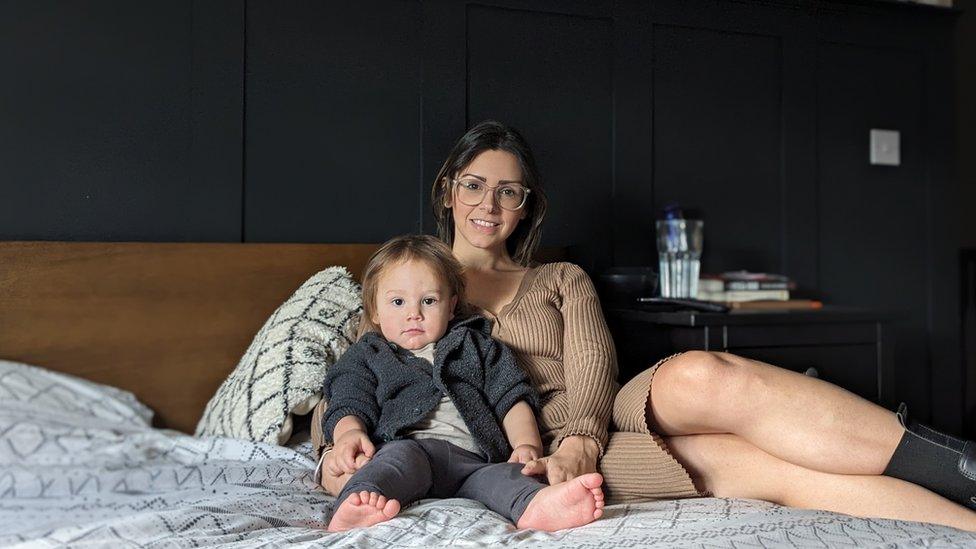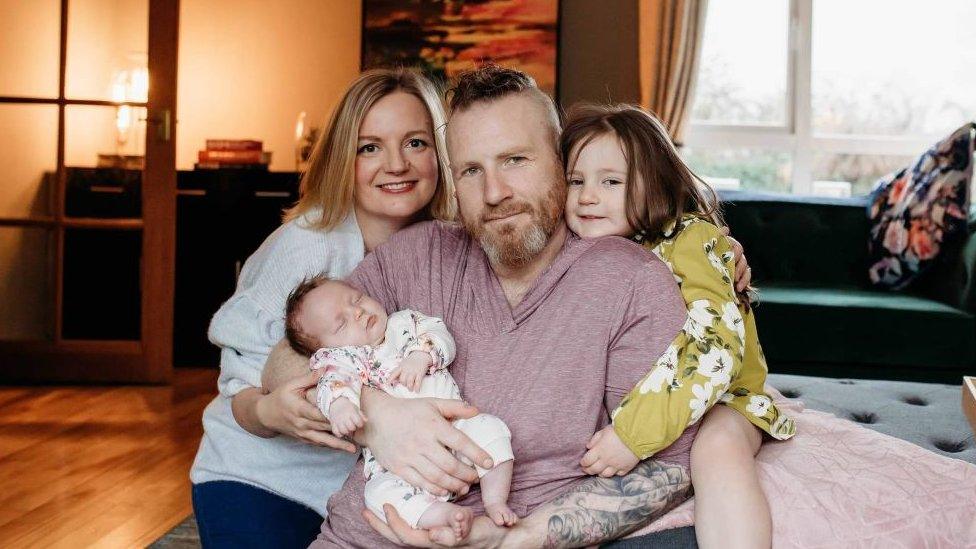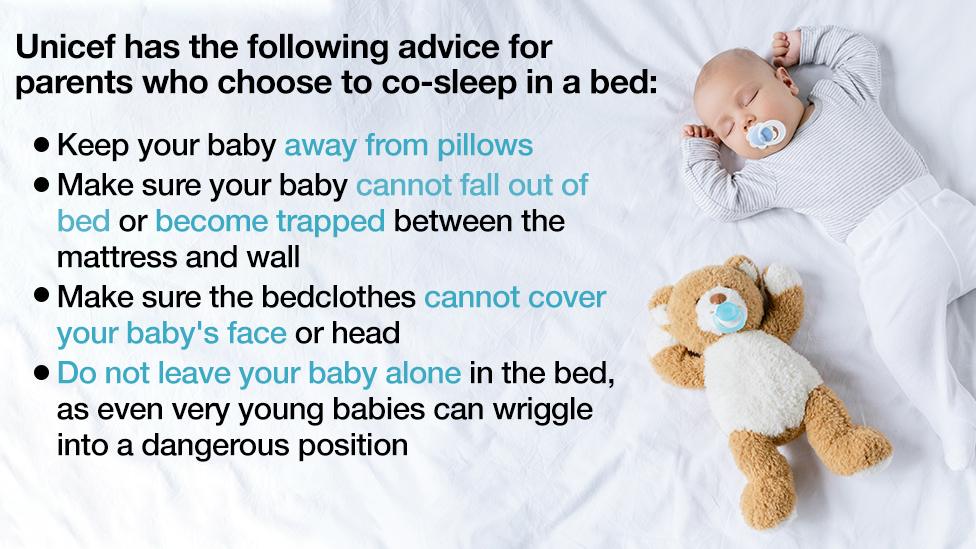Baby sleep: How to bedshare if you really have to
- Published

Abbie Branagh bedshares with her son Zach, and is relieved new mums now have NHS advice on how to do it safely
The safest place for a young baby to sleep for the first six months of its life is in a cot, rather than the same bed as their parents.
Whilst this remains the advice from the NHS, its guidance has now been updated to acknowledge that bedsharing may sometimes take place, and what people can do to make it safer.
Meet the mums who share beds with their babies - and no longer have to hide it from health visitors thanks to a change in advice from the NHS.
After having her first child, Abbie Branagh did not sleep for days.
Her daughter Thea would only sleep in her arms and Abbie - terrified of hurting or suffocating her baby - kept herself awake overnight in a hospital bed, only getting relief in short bursts when her partner came to visit in the daytime.
Coming right after an emergency Caesarean section under general anaesthetic, the experience left her sleep deprived, traumatised, teary and overwhelmed.
"I kept asking what am I doing wrong, what's wrong with my baby?" she said.
When they got home, Abbie put Thea in the Moses basket she had been recommended to buy - a small cot, in the same room - but said: "We were lucky if she slept for 20 minutes in it."
'It's hard when you haven't slept'
With her second and third child, Abbie bedshared from day one.
Until last year, the NHS advice was to "never bedshare" with an infant, to prevent suffocation and cot death.
But overtired parents falling asleep on a sofa or armchair is much more dangerous than planned bedsharing. According to the Lullaby Trust - which campaigns against cot death - babies sleeping on a sofa or armchair are 50 times more likely to die of SIDS (Sudden Infant Death Syndrome) or to accidentally slip into a position where they are trapped and cannot breathe.
In an attempt to prevent such tragic incidences, the NHS has published pointers, external for how to be safe if you share a bed, as it is estimated many parents may do at some point.
Abbie is one of several mums who told BBC News NI of their relief that they no longer feel the need to "hide" the practice from their health professionals.
"This takes away the guilt," said Abbie, at home in Belfast with her youngest son on her lap.
She read about the "fourth trimester", external and learned it was normal for her newborn to feel safest close to her.
Abbie explained bedsharing had made things "so much easier" and she feels more relaxed hearing her youngest breathing next to her, and is able to sleep better.
"I count myself lucky to have come across that information so early on," she said. "It's really hard to be a good parent if you haven't slept."
So what are the guidelines?

Bedsharing - what you need to consider
Put the baby on their back, on a firm mattress, with all pillows and bedding cleared well out of the way - this is to prevent suffocation and overheating
Make sure no other children or pets are in the bed
Never fall asleep with your baby on a sofa or armchair
Check to make sure the baby cannot get stuck or trapped between the bed and the wall or headboard
Never leave a baby unattended in an adult bed
Never bedshare with a baby if you have drunk alcohol or if you have taken any drugs - including medications - that could make you drowsy
Never bedshare with a baby if you or your partner smokes, no matter where you smoke - researchers have long seen a correlation between parental smoking and baby death and while they don't know exactly what causes this, they think nicotine may affect the parts of babies' brains that interfere with sleeping and breathing patterns
Never bedshare with a baby who had a low birthweight (less than 2.5kg or 5.5lb)
Source: NHS, PHA, Lullaby Trust

A few years after Abbie spent all those nights awake and frightened, another mum sat up through the night in Newtownards, County Down.
Caryn McKee sat on a cold floor, holding Megan's hand through the bars of her cot and trying to settle her to sleep, four or five times a night for the first year of the baby's life.

Caryn McKee with her family - she says her older daughter Megan didn't get the sleep she needed in her cot
"I was so scared of suffocation - I think most first time mums are," she said.
"I suffered really badly with sleep deprivation and she didn't get the sleep she needed."
'Cuddle curl'
When she learned about safe bedsharing, it was a "lightbulb moment".
"Babies know that they need their their mother, their father, their primary caregiver close by to keep them safe. They need warmth. They need to hear the heartbeat. They need milk," she said.
"And it's how babies have slept naturally for thousands of years, and in many. many different cultures across the globe."
With her second daughter, Hannah, who is now two years old, Caryn bedshared from day one in hospital.
She uses the "cuddle curl", a protective shape where she lies on her side and curves her arm above Hannah's head to prevent her from pushing herself towards the headboard.
Bedsharing allows her to breastfeed through the night, often without fully waking up.
"Not only do I get so much more sleep than I ever thought, we have that bonding," Caryn said.
"We have those moments where I just look down while she's soundly asleep and I'm in a little bubble of oxytocin.
"It takes some time back from all the demands of the day. There's nothing better."

Emily Roberts, safeguarding nurse consultant with the Public Health Agency in Northern Ireland, said parents should be open with their health visitors to minimise risk.
She told BBC News NI: "A parent may find themselves in a situation where they choose to take their baby into bed, because that is their choice to do that, or indeed they may accidentally take their baby into bed and fall asleep with them.
"We need to prepare our parents for those situations.
"We would ask parents and our health professionals to have open and honest discussions."
Megan Watters, a mum of two in Lisburn, County Antrim, admits to lying to her health visitors after her first child, Cameron, was born.
"I felt so guilty for bedsharing," she said.
"The health visitor would come out and ask was he sleeping in his crib and I would say uhhh yes."
When her second child, Cora, was born, the new guidelines had been put in place. Megan remembered thinking: "Oh, I don't have to pretend that I'm not bedsharing this time. I can say that I am."
This report has been amended for clarity and to highlight relevant NHS guidance.